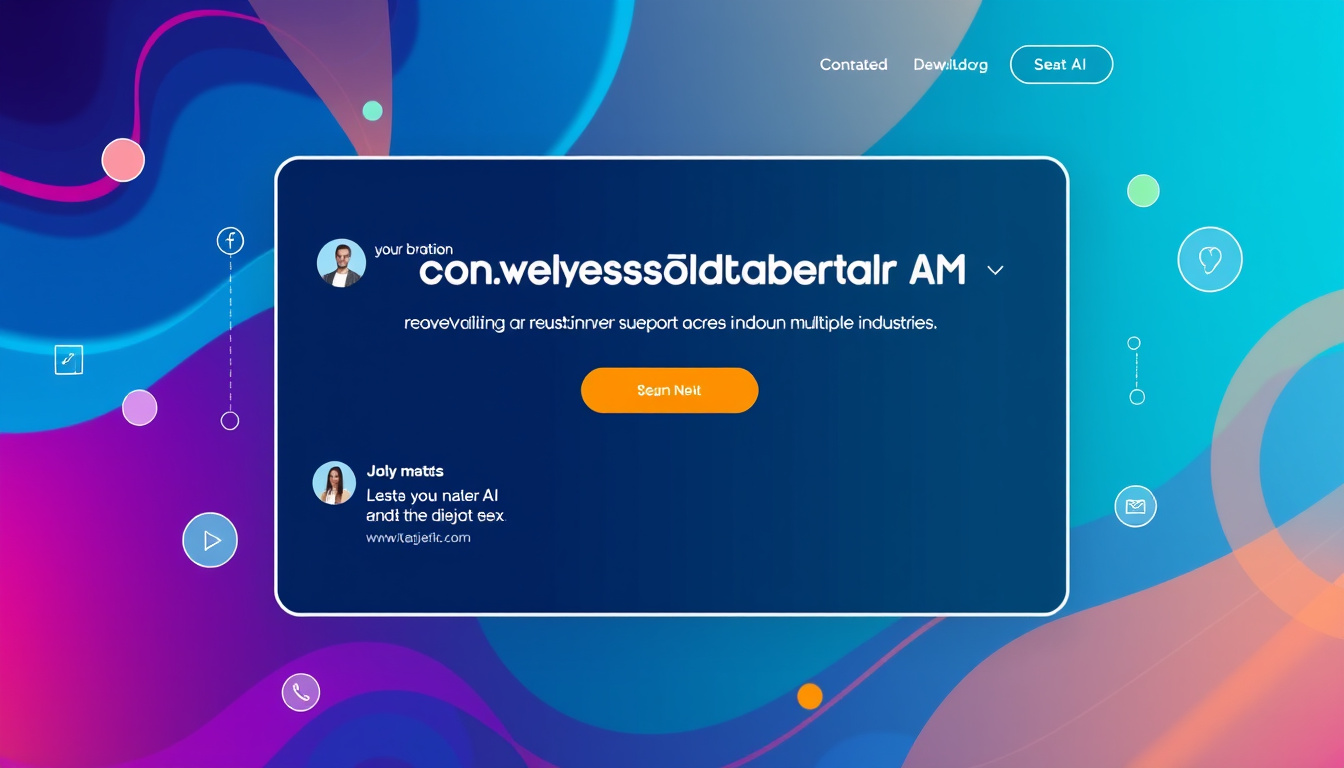In today’s fast-paced digital landscape, conversational AI is revolutionizing how businesses interact with their customers. By enabling natural, real-time communication through chatbots, virtual assistants, and voice recognition technologies, conversational AI is reshaping the customer experience across multiple industries. Companies leveraging these intelligent systems are seeing improvements in customer satisfaction, operational efficiency, and personalized engagement—making conversational AI an essential tool for modern customer service and sales strategies.
Understanding Conversational AI and Its Role in Customer Experience
Conversational AI refers to the use of artificial intelligence technologies—such as natural language processing (NLP), machine learning, and speech recognition—to create systems that can engage in meaningful, human-like dialogue with users. Unlike traditional scripted chatbots, conversational AI is capable of understanding intent, context, and sentiment, allowing for more personalized and dynamic interactions.
This capability is particularly transformative for customer experience because it breaks down barriers between customers and brands. Instead of frustrating phone menus or waiting on hold, customers can receive instant responses and solutions 24/7. The result is a smoother, more efficient, and tailored user journey that increases loyalty and drives revenue growth.
Key Industries Benefiting From Conversational AI
Conversational AI is making waves across a variety of sectors, each leveraging this technology to meet unique customer needs and challenges:
1. Retail and E-commerce
In retail, conversational AI assists shoppers with product recommendations, order tracking, and returns processing via chat or voice. For example, virtual assistants can guide users through online catalogs based on preferences and past purchases, enhancing personalization without requiring human sales agents at every step. Additionally, AI-driven chatbots help reduce cart abandonment by addressing last-minute concerns instantly.
2. Banking and Financial Services
Banks and financial institutions have adopted conversational AI to streamline customer inquiries related to account balances, transaction histories, loan applications, and fraud detection. Virtual assistants offer secure and compliant methods for customers to access information anytime. This reduces call center volume while improving accessibility and satisfaction.
3. Healthcare
Healthcare providers use conversational AI to schedule appointments, provide medication reminders, and answer frequently asked questions about symptoms or procedures. These AI-powered tools improve patient engagement by offering timely support and triage outside clinic hours, allowing clinicians to focus on complex care tasks.
4. Travel and Hospitality
In travel and hospitality, conversational AI helps customers book flights, hotels, and rental cars through natural dialogue interfaces. It can also deliver personalized travel recommendations, update travelers on itinerary changes, or assist with complaints quickly, elevating the overall experience and brand reputation.
5. Telecommunications
Telecom companies utilize conversational AI to troubleshoot technical problems, manage billing inquiries, and upsell services. This reduces wait times and enables more proactive service delivery, fostering customer retention in a highly competitive market.
How Conversational AI Enhances Customer Experience
Conversational AI promotes customer experience improvements in several important ways:
- 24/7 Availability: Unlike traditional customer service, AI assistants operate continuously, guaranteeing immediate responses anytime.
- Personalization: By analyzing past interactions and preferences, conversational AI delivers tailored content and recommendations.
- Scalability: Businesses can handle exponentially more queries simultaneously without needing proportional human staff increases.
- Cost Efficiency: Automating routine tasks decreases operational costs and reallocates human agents to high-impact activities.
- Consistent Service Quality: AI ensures uniformity in responses and brand messaging, reducing errors or inconsistencies.
- Multichannel Presence: Conversational AI can integrate across websites, mobile apps, social media, and voice devices, providing seamless omnichannel support.
Implementing Conversational AI: Best Practices
To maximize the benefits of conversational AI for customer experience, organizations should consider the following best practices:
- Define Clear Goals: Understand what customer pain points or business objectives conversational AI will address.
- Invest in Quality NLP: Choose technologies that accurately comprehend diverse languages, accents, and user intents.
- Focus on User Experience Design: Ensure dialogs feel natural, intuitive, and guide users effectively toward resolution.
- Incorporate Human Escalation: Enable seamless handoffs to live agents when complex issues arise.
- Monitor and Optimize: Continuously analyze conversational data to improve AI understanding and response quality.
- Ensure Data Privacy and Security: Adhere to regulations and communicate transparently about data usage to build trust.
Real-World Examples of Conversational AI in Action
Several industry leaders have demonstrated how conversational AI can transform customer experience:
- Sephora: The beauty retailer uses AI chatbots on messaging platforms to provide personalized product recommendations and tutorials, creating interactive shopping experiences.
- Bank of America (Erica): A virtual financial assistant offering customers insights, bill reminders, and fraud alerts via voice and chat interfaces.
- Mayo Clinic: Utilizes virtual health assistants to help patients schedule appointments and get answers to common medical questions, reducing administrative burden.
These examples highlight how conversational AI not only improves operational efficiency but also builds deeper customer relationships through meaningful interactions.

FAQ: Conversational AI and Customer Experience
Q1: What is the difference between conversational AI and traditional chatbots?
Conversational AI uses advanced machine learning and NLP to understand context and intent, enabling more natural, dynamic conversations, while traditional chatbots typically follow pre-defined scripts and workflows.
Q2: How can small businesses benefit from conversational AI?
Conversational AI provides small businesses with affordable, scalable customer support that operates 24/7, helping them compete by offering personalized and timely responses without large staffing costs.
Q3: Is conversational AI secure for handling sensitive customer information?
Yes, when implemented properly, conversational AI platforms comply with data protection regulations and employ security measures such as encryption and access controls to safeguard customer data.
Conclusion: Embrace Conversational AI to Elevate Your Customer Experience
The transformative impact of conversational AI across industries is undeniable. By delivering instant, personalized, and accessible service, businesses can better meet evolving customer expectations and foster long-term loyalty. Whether you operate in retail, healthcare, finance, or beyond, integrating conversational AI into your customer experience strategy is a powerful way to differentiate your brand and drive growth.
Ready to revolutionize your customer interactions with conversational AI? Start by evaluating your customers’ most common pain points and exploring AI solutions tailored to your industry. Embracing this technology today will equip your business for the digitally connected future, enhancing satisfaction and operational excellence.
For more insights on AI-driven customer engagement, visit Gartner’s report on Conversational AI and discover best practices for implementation. Don’t get left behind—take the conversational AI leap and transform your customer experience now!




